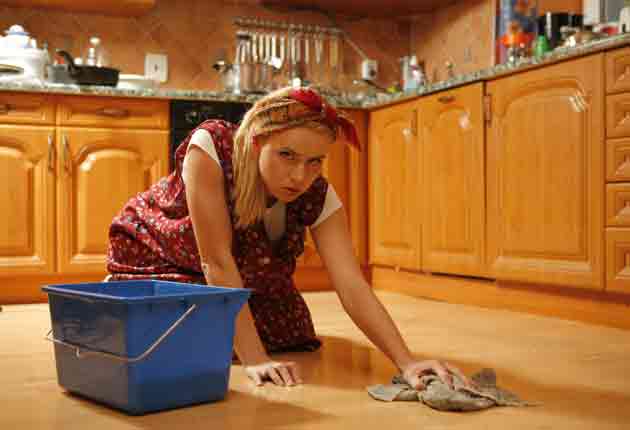Polish cleaner blows the lid on 'dirty' Germans

The much-vaunted Teutonic virtues of organisation and order have been dealt a withering blow in a new tell-all book – by a Polish char lady – which exposes her German employers as mean, filthy homeowners, who don't pay up and set devious traps to check that her work is done.
Under German Beds by the 32-year-old Polish cleaner – who writes under the pen name Justyna Polanska – has only just been released, but the account, which is drawn from her 12 years' experience of cleaning for well-to-do German households, already seems destined to be a bestseller.
The book was among Germany's 100 top sellers after only six hours yesterday. "I hope that my bad employers read this book and start behaving better," Justyna told The Independent. "The idea is to persuade everyone who has a char lady to think again," she added.
Justyna is one of the estimated 500,000 Polish cleaning women who have arrived Germany since the collapse of communism in search of better pay in return for often humiliating, hard physical work. She has the Polish equivalent of A-levels and came to Germany to learn the language. She hoped to train as a make-up artist. "That never happened, so like many Polish women I ended up as a cleaner," she said.
She describes how the overwhelming majority of Polish home cleaners in Germany are obliged to work on the black market, despite strict laws which outlaw untaxed jobs. Her employers include judges, policemen and lawyers, but none were prepared to accept Justyna as a legal employee and refused point blank to meet the extra costs that declaring her job would have incurred. In one case, her policeman employer, who refused to grant her legal status, spent the day tracking down black market workers on building sites.
She relates how she cleaned for judge who insisted that she dust cannabis plants he kept in his apartment that had been seized by police during a drugs raid. "It's pointless chucking away things that have been confiscated," the judge told her.
However, some of the most stomach-turning passages in the book are the author's detailed accounts of the type of filth that she has been obliged to clear away during her charring odyssey. Under beds, she finds the remains of whole toenails, the decaying corpse of the family pet hamster that has been missing for weeks and even two extracted wisdom teeth.
"When I lived in Poland, I thought Germans were all clean and orderly," Justyna said. "However, I since have discovered that most of this is a façade and that there is a lot of dirt behind it."
Filth is not the only problem Justyna encounters. Her employers also set humiliating traps which are designed to test the honesty or thoroughness of their home cleaner. In one incident, she discovers a quantity of euro notes, strategically placed under a bed. "I always put the notes back on top of the bed," she explains.
In another incident, an elderly woman deliberately smeared the underside of a lavatory seat with excrement to monitor whether she had cleaned everywhere. Furthermore, would-be employers treat her with contempt and use racist insults. She describes how some Germans who answer her newspaper advertisements offering her cleaning services hear her foreign accent and instantly demand: "Where do you come from?" Her reply: "From Poland" not infrequently elicits the answer: "No thanks" or "Shit Polack".
"There are those who think that a cleaning woman loves dirt and therefore deserves to be treated as such," she said. She relates how a wealthy woman employer took her into her bedroom to show her a dress she had just bought on a shopping trip to New York. On pay day, however, she left only half her weekly wage on the kitchen table and a note which said: "Sorry, Justyna – short of cash."
It comes as a relief to learn that not all of Justyna's employers are quite so insufferable. "The good ones call me 'my pearl' – it may sound like kitsch, but it shows how much they value me," she said. "They are the ones who say hello when they run into me on the street. There are not many like that," she added.
Making a tidy sum across the border
* Polish cleaning women make up around a third of the estimated one and a half million Poles living in Germany. The overwhelming majority work on the black market.
* Thousands of Polish women, many of them with qualifications for less arduous jobs, started making for Germany's big cities after the fall of the Berlin Wall, first to earn German marks and then euros.
* The "Polnische Putze" (Polish charlady) has become almost a standard requirement in wealthier German households since the collapse of Communism in 1989.
* Germany has strict laws outlawing cash-in-hand jobs. However, most Germans with Polish cleaners refuse to declare their charlady employees because they would be obliged to pay additional taxes if they did.
Join our commenting forum
Join thought-provoking conversations, follow other Independent readers and see their replies
Comments